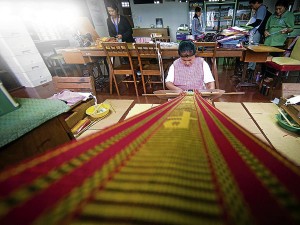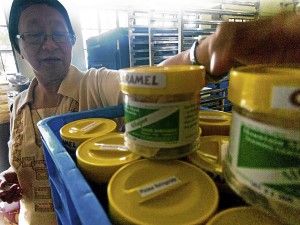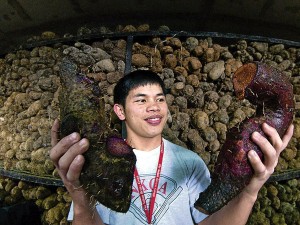Inquirer Northern Luzon
10:07 pm | Saturday, November 5th, 2011
Or with no other option, she would have married early and would have been preoccupied with motherhood at an early age.
But she had big dreams; she wanted to pursue college.
She was determined and optimistic that there was a way to pursue her dream. And thanks to her parish priest, who recommended her to work her way to college through the Mountain Maid Training and Development Foundation.
“God willing, I seek to finish my college two years from now,” says Lubbong. Taking up Bachelor of Science in Business Administration and majoring in marketing, the 19-year-old Ifugao lass will be delayed by a year to finish her four-year course.
The reason: She spends three days in school and three days each week at the foundation.
Managed by the Sisters of the Good Shepherd, the foundation has been helping send poor Cordillera children, mostly young girls, since 1952 through its now famous products such as strawberry and ube jams.
Other products include peanut brittle, orange marmalade, cookies, lengua de gato (a special kind of cookies) and bread.
Lubbong is now one of the storekeepers at the foundation’s store where hundreds of customers queue up, especially during holidays such as Christmas, the Baguio flower festival and Holy Week.
 |
| AN EMPLOYEE of the Sisters of the Good Shepherd Convent weaves cloth for the facility that has become known for its ube jam. |
But the young lad from Tuba, Benguet, insisted that there must be a way to pursue college even if it meant working part-time while studying. Through his local parish, he came to learn about the foundation run by the Good Shepherd sisters.
Now 20, Rivera has finished his Bachelor of Science in Financial Management and is taking up his second course, accounting technology.
While completing his second course, Rivera is also assigned at the foundation’s store, helping inventory items sold if he is not helping attend to customers.
Being assigned at the store is “some sort of promotion” for Rivera. “When I was just out of high school (he was just 16 then), I was initiated into the challenging task of manually grinding peanuts using a rolling pin,” he says.
Peanuts have to be ground before they are mixed with other ingredients such as sugar and rolled again with a rolling pin to produce one of the foundation’s famous major products – peanut brittle.
Lubbong and Rivera are among over 200 youths, mostly from the Cordillera, who are seeking to become professionals after “graduating” from making strawberry or ube jams or peanut brittle at the foundation.
The foundation’s ultimate idea is to empower young people through education, which will give them better opportunities and choices, says Sister Guadalupe Bautista, the foundation’s coordinator.
 |
| SISTER Guadalupe Bautista shows off their newly made home-style cookies at the bake shop of Good Shepherd in Mines View, Baguio City. |
A few others opted to take up short courses such as auto servicing, nursing aid training, electronics, secretarial and care-giving.
The Good Shepherd sisters’ vision and mission to educate poor but deserving young people by giving them ways and means to work their way to college has a long history.
The sisters’ program evolved from the dream of late Bishop William Brasseur, then apostolic vicar of Mt. Province. As a young CICM missionary assigned to the Cordillera in 1931, Brasseur had seen early on the need for education of poor but gifted young people of the highlands.
He thus requested the Sisters of the Good Shepherd to set up a foundation here.
Mother Mary Ursula Jung, the Religious of the Good Sisters (RGS) superior general at that time, gladly acceded to Brasseur’s request.
On Nov. 11, 1952, the RGS Los Angeles province in the United States assigned four sisters to Baguio. Having discovered that strawberries could grow well in Baguio and Benguet, they taught young Igorot girls how to make strawberry jams.
The first jam they cooked in a small pot launched a cottage industry, which would soon support the education of thousands of young Cordillerans.
The Brasseur-inspired initiative of the nuns of educating and thus empowering young people through a homegrown industry is now considered one of the models of what is called “social enterprise.”
A social enterprise, says one definition, is an organization that applies business strategies to achieving philanthropic goals. The terms social entrepreneur and social entrepreneurship were used first in the literature on social change in the 60s and 70s.
The almost seven-decade initiative of the Good Shepherd nuns is now well-recognized by advocates of social enterprise.
Last October 20 and 21, civil society and business sectors sat down to listen to Sister Guadalupe Bautista share the success story of the Mountain Maid and Training Development Foundation at a conference in Makati City organized by the private Peace and Equity Foundation (PEF).
The PEF is spearheading “Social Enterprise: The Next Business Model” as part of new program focus.
Recently, the Social Security System recognized and awarded Mountain Maid the “2011 SSS Balikat ng Bayan Award” as “Top Employer for North Luzon-Medium Category.”
In 2009, the Department of Labor and Employment awarded Mountain Maid a “Business Excellence and People’s Development Award.”
In 2010, the Baguio Centennial Commission also recognized the nuns as among the city’s builders for their mission and social enterprise work.
PHOTOS BY RICHARD BALONGLONG/ INQUIRER NORTHERN LUZON
http://bit.ly/tqtHso

No comments:
Post a Comment